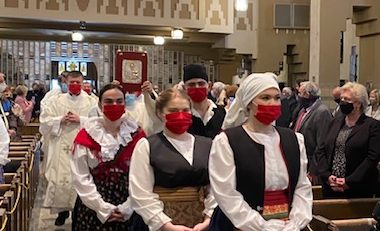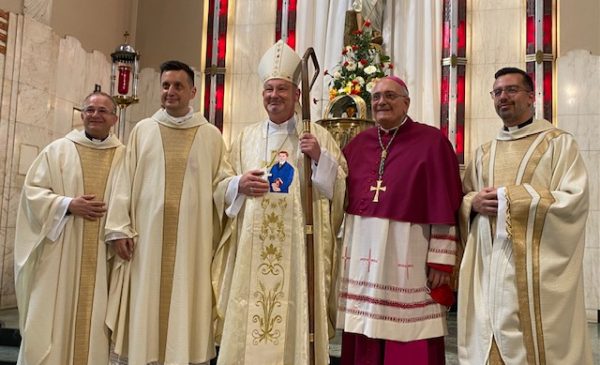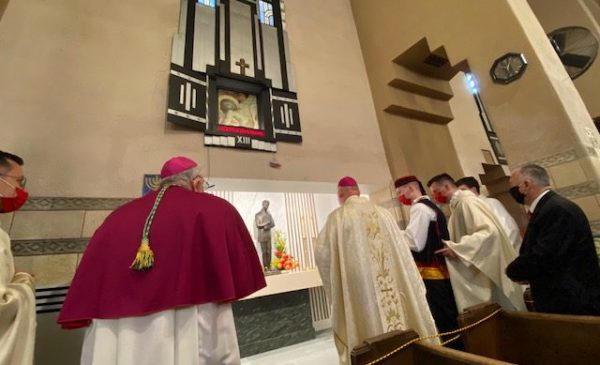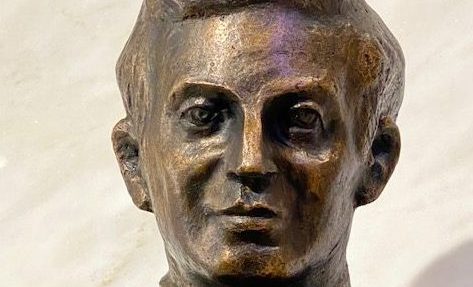ASTORIA — Traveling across the tri-state area to worship at Mass in their “mother language” doesn’t seem to faze a faithful congregation of 200 Croatian-speaking Catholics.
Their homeland, after all, is some 4,300 miles to the east, but these distinguished grey-haired members have been attending services at Most Precious Blood Parish in Astoria, Queens, since 1971.
That year, the parish formed what today is called the Croatian Apostolate of Blessed Ivan Merz to serve a massive wave of immigrants from the former Yugoslavia.
Fifty years later, members rejoiced with a May 2 Mass celebrated by Bishop Ivica Petanjak from the Diocese of Krk in Croatia. Bishop Nicholas DiMarzio of the Diocese of Brooklyn presided.
Many of its original members have since moved from Astoria to settle on Long Island, New Jersey, Connecticut, and other boroughs of New York City. Still, Most Precious Blood is their home parish.
“I got married in this church — 1973,” said Željko Maračić.
“I christened my two kids here, my son and my daughter,” added Antone Zic.
Maračić said the community cherishes the opportunity to celebrate Mass “in our mother language.”
“You can go to any church,” he added, “but somehow we people like to go to the mother language for Mass.”
Before the event, Bishop DiMarzio said Astoria once welcomed many Croatians, drawn when restrictive U.S. immigration laws were eased in 1965.
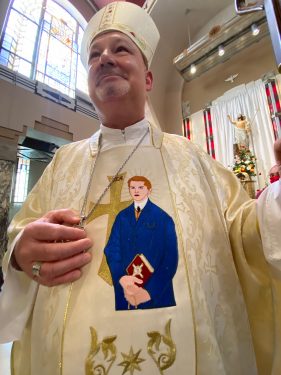
More than a half-century before that, the Diocese of Brooklyn had already earned its moniker as the Diocese of Immigrants. New arrivals, that began in the late 1960s, reinforced that reputation.
“We had become an immigrant country and diocese again,” Bishop DiMarzio said. “By the early 70s, we saw new immigration from Croatia, Italy, other European countries, but mostly from Latin America, which was almost nil before then.”
Many of the Croatians eventually left Astoria to pursue better housing and career opportunities throughout the region.
“But they do come back to the Mass,” Bishop DiMarzio said. “This is a gathering point. The community is very vibrant.”
For example, the apostolate has a bilingual faith formation program that helps succeeding generations become rooted in their ancestors’ devout legacies. They learn folk dancing, but also hymns and prayers in Croatian.
“It’s a real immigrant need,” Bishop DiMarzio said. “People want to preserve their language and their culture. It’s tied in with their faith, and you can’t separate it out.”
The bishop praised parish leaders for stoking the apostolate’s vibrancy.
He noted that Father Vedran Kirinčić, the pastor, and Father Sasa Ilijic, parochial vicar, are both “on loan” from the Diocese of Krk. He praised Bishop Petanjak for deploying them to Queens.
“We’re so happy that we have two native speakers who are taking care of the people,” Bishop DiMarzio said. “Both of them were secretaries to the bishop, so he’s sending us his best men.”
For Father Kirinčić, it is a long-term assignment. He’s approaching his ninth anniversary with the Diocese of Brooklyn, while Father Ilijic arrived recently.
Father Kirinčić said the Diocese of Krk has shared priests with Most Precious Blood Parish since the Croatian apostolate began in 1971. He said his predecessors prepared the way for him.
He described how Father Robert Zubovic organized relief drives in Queens to help victims of the Croatian War of Independence in the early 1990s. Parishioners shipped numerous containers of food and clothing to the war zone.
When an earthquake rattled Croatia in January, the apostolate responded again, raising some $30,000 in relief funds, Father Kirinčić said.
Most Precious Blood Parish serves multiple cultural groups, with Masses celebrated each Sunday in English, Croatian, Spanish, and Tagalog. The parish will celebrate its 100th anniversary in 2022.
During the celebration, the chapel of Blessed Ivan Merz was dedicated by Bishop Petanjak, with Bishop DiMarzio observing. Blessed Ivan Merz, 1896-1928, is a candidate for sainthood who proclaimed the Catholic faith among fellow Croats, especially the youth.
A veteran of World War I, he went on to become a college professor teaching French language and literature in the former Yugoslavia. But as a lay servant to the Church, he was credited for championing the liturgical revival among Croats in the 1920s. He died at age 32 from complications resulting from a severe jaw infection. The parish’s Croatian Apostolate now carries his name.
The event carried the theme “Our Home Away from Home,” which Father Kirinčić explained was meant to honor Most Precious Blood Parish and the Diocese of Brooklyn.
“Both accepted our language and our liturgy,” he said. “Many people left their parents; left their traditions. But when they came here, they found their home away from home.”

